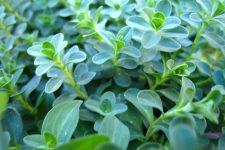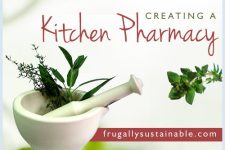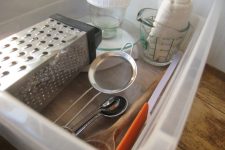
The art of tea making has been prized for many thousands of years. In fact, it is one of the most common methods for the consumption of medicinal herbs.
It’s a simple process that requires simple tools. So long as you have…
- boiling water
- a pot, cup, or jar
- herbs
…you have a very safe and effective healing remedy.
Herbal teas can be prepared either through infusion or decoction based on the delicacy of the plant material.
Infusions
Creating an herbal infusion involves pouring boiling water over parts of the plant such as leaves, flowers, and stems then allowing the infusion to steep for 10 to 45 minutes (The longer the steeping time the more beneficial components of the herbs are released into the water). Note: Cover the jar, bowl, or cup while steeping to avoid the loss of medicinal properties from evaporation.

As with oil infusions (we’ll talk more about this next post in the series), you may also create an herbal water infusion by using solar or cold infusion methods. In order to do so, combine the herbs and room temperature water in a glass jar. For a solar infusion, place the covered jar in a sunny location and allow to steep for 2-8 hours. And for a cold infusion, you can simply leave the jar in the refrigerator to steep overnight then strain in the morning.
Herbal infusions can be prepared in larger quantities and refrigerated (up to 3 days) for convenience and ease of use during times of illness.
Decoctions
Decoctions refer to the method of extracting the medicinal properties of the more substantial parts of the plant, such as the roots, barks, or seeds.
In order to prepare herbal teas using this method, one would be required to place the herb and water into a covered pot and bring the mixture to a simmer for 15-45 minutes on the stove, depending on the strength needed.
Important to Note: Don’t panic if you happen to infuse a root herb that should have simmered…your creation is still good and contains many healing properties.
Preparation and Dosage
A good rule of thumb for preparing herbal infusions or decoctions is to use a ratio of 1 tablespoon of dried herbs — or 2 tablespoon of fresh herbs — to 1 cup of water. These days, I rarely ever make tea by the cupful — it’s just to time consuming. Instead, my favorite way to prepare daily medicinal teas is to grab a quart-sized mason jar and place a handful (approx. 1/4 cup) of dried herbs in the jar. Fill to the top with boiling water and infuse in the refrigerator overnight. I strain it in the morning and keep the jar with me — drinking it all throughout the day.
I generally use this method for nourishing and immune-system building tea blends.
But during times of illness, the rules are a bit different — and the effectiveness of the tea is seen in small, more frequent dosages. For example, at the onset of a fever or headache begin sipping on an appropriate tea — taking 1/4 to 1/2 cup of the beverage — every 30 minutes until the symptoms are relieved.
Although medicinal teas aren’t quite as concentrated and potent as a tincture, I believe strongly in their ability to support the body toward health.
What about you? What’s your favorite way to make medicinal teas and how often do you drink them?





 How to Make A Cold and Flu Tincture Using Homegrown Herbs ~ A Recipe
How to Make A Cold and Flu Tincture Using Homegrown Herbs ~ A Recipe
Crazy coincidence once again… I am sitting here reading this with the first cup of medicinal tea I’ve ever made. My throat is always scratchy in the morning, so it has licorice root, nettle, orange peel, cardamom and anise pods, and one whole clove. It’s so good!
That’s just awesome Amanda 🙂 Your tea sounds very yummy!
Nettle tea…a long standing spring favorite here. Great post.
*anna
Yes Anna! I’m in love with nettles and alfalfa these days…drinking daily infusions has made a huge difference in my energy level!
I was wondering if you could can the herbal teas the same way I can my veggies?
Huh! Do you mean the plant material or the liquid infusion? My initial thoughts are that this would cause them to loose potency. Thoughts anyone…
Presumably, being medicinal, preserving a pleasant taste isn’t necessarily the goal here. But, just out of curiosity, flavor-wise does the same thing apply here as with steeping tea leaves? With tea, generally to produce a stronger flavor you use more leaves. Leaving it to steep for longer than a couple minutes (or four to six, depending on the type) causes more bitterness.
Yes the bitterness of teas such as black or green is a result of a longer steep. This is due to the tannins in the tea (and more are released in a longer steep). Many herbs contain only small amounts of tannins. I gernally use more plant material in herbal infusions to produce a more potent remedy 🙂
I plan on harvesting black berry leaves this weekend. I’ll dry some right away and then try and ferment some and then dry. Fermenting is suppose to improve the flavor and healing properties.
Oh! I like the sound of that…let me know how it turns out for you!
Nice post!
When I’m making nourishing herbal infusions (nettle, oatstraw, red clover, etc.), I steep a whole ounce of it overnight (and not in the fridge, although that’s how I store it after straining in the morning). I learned this method from the famed herbalist Susun Weed, and have a post about it…
http://theselightfootsteps.com/2012/03/07/introduction-to-nourishing-herbal-infusions-2/
Great post Christine! That’s my favorite method too! It’s so easy and practically makes itself.
Thank you for the post. Could you tell what are the differences between an infusion and a cold infusion? Would the infusion with hot water extract more or different things from the herbs or do they do the same job? Thanks!
The heat of the infusion does help to release the healing parts of the plant material quicker and more effectively, but the cold or solar infusion method — I believe — has special benefits all it’s own 🙂
Great to know. I was told not to bring the water to a rolling boil but that the water should have squiggly air bubble lines through it when making teas. I do not recall the reason why though. Does anyone know or have an opinion on this?
Pouring boiling water over herbs cooks them, not steep them. I bring water to a boil, let the bubbles calm down and then pour.
The idea of losing ‘medicinal properties’ through evaporation is a falsie – don’t worry, vitamin C etc doesn’t change state into steam like boiling water does. You’ll just have your infusion get ever so slightly more concentrated as a tiny bit of your water evaporates.
can anyone tell me where to find licorice root or marshmallow root?
Does anyone know a mix for like stress something good for the mind.